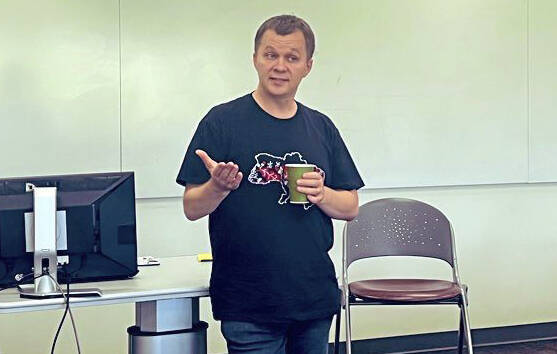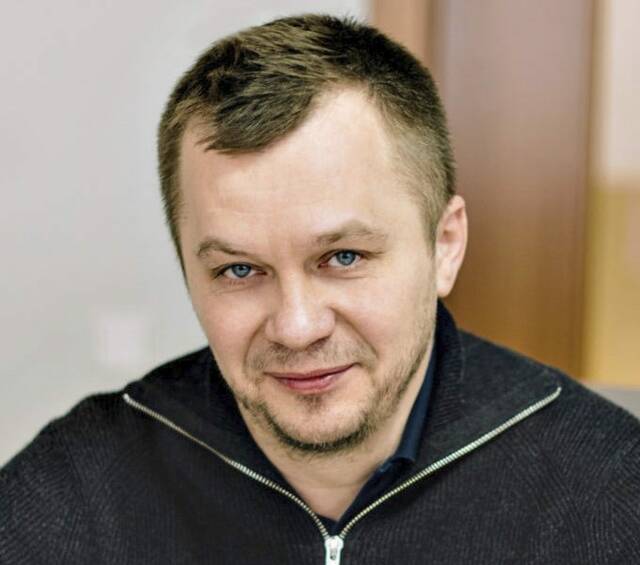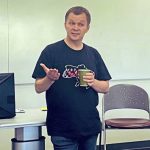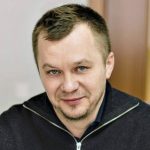For the better part of the past decade, Tymofiy Mylovanov has maintained a dual role as president of the Kyiv School of Economics and an associate professor of economics with tenure at Pitt, traveling back and forth between Kyiv and Pittsburgh.
In the year since Russia invaded Ukraine, maintaining that dual role has been a challenge. Mylovanov, 47, has been on sabbatical, a paid leave from Pitt, while he has worked to keep the doors open at the Kyiv School of Economics in the face of supply chain issues and dangers created by the war that began when Russia invaded Ukraine on Feb. 24, 2022.
“The university should be operational because if we stop operating, it means Putin won,” Mylovanov said.
So far, Mylovanov has not had to take part in combat, but said he will pick up a weapon if he has to. Right now his fight is to make sure that higher education goes on in his home country.
Mylovanov (pronounced Mee-low-vahn-off) is a Ukrainian citizen. After returning from Pittsburgh to Kyiv a year ago, he kept the school open even as war loomed, and in the year since the war began, he has managed to keep the school functioning despite the war and the fact that enrollment is down about 10%.
He said some of the school’s alumni have died in combat and he’s been forced to take cover in bunkers on an almost daily basis.
Mylovanov, a former Minister of Economic Development, Trade and Agriculture of Ukraine, feels fortunate that he and his wife Natalia, who works with a think tank, are able to work and travel together. They have no children. He returned to the U.S. this month for a two week visit — including stops in Pittsburgh, Massachusetts, where he spoke at UMass Amherst; and Chicago to speak at Northwestern University.
Even though he could have stayed in Pittsburgh and the relative safety of the Pitt campus, Mylovanov said he never questions his decision to return to Ukraine.
“I understand what I’m doing, what I’m trying to achieve for the world. Who I’m protecting, who I’m fighting,” he said. “Everyone is clear what their main purpose is and I think that’s the main change in the last year.
“I have the Kyiv School of Economics. I have to lead it — it’s about the future of the country. It’s very clear why you need education. We need to give students a future, otherwise they all will leave. Even if they stay, you will have a lost generation (without universities), right?
Mylovanov said he has had to develop his own coping mechanisms.
“One I have is, of course, my family. The other is what I do. The third one is on the physical side, I’m really much more conscious about my health. Ironically, I’m in better shape than before (the war) because for the last five or six years I had high cholesterol and now I have brought it back to normal. I’ve lost 10 kilos (22 pounds) during wartime, not from stress, but because I consciously worked on it. So, I’m much more disciplined than before,” Mylovanov said, adding that he now runs regularly or uses an elliptical machine and watches what he eats.
Mylovanov said his mental outlook has improved as well.
“The war made me a kinder, better person,” he said. “I have much more empathy for people than before, for my family, for people around me, and it’s much more rewarding. It’s healing the trauma I get from the war.”
Mylovanov’s colleague Jennifer Brick Murtazashvili, professor at the Pitt Graduate School of Public and International Affairs and founding director of the Center for Governance and Markets, has known him for 20 years.
“He’s extremely passionate, inspirational and brilliant and it’s the combination of those three that makes him an outstanding leader,” she said. “He sees something happening, he jumps at it. He thinks strategically. He mobilizes people quickly around ideas and he gets things done. So, he’s very, very responsive, but always on the cutting edge. This was long before (the war in Ukraine).”
Murtazashvili said she admires the difficult choice Mylovanov made to stay in Ukraine this past year.
“Tymofiy ran into the fire and he did not allow his university (Kyiv School of Economics) to collapse, he kept his faculty together, he kept them inspired,” she said. “Not only that, the university that he is running is thriving with new ideas, new programs. They’ve raised tens of millions of dollars for humanitarian causes. He’s been on the cutting edge of thinking about post-conflict reconstruction and how to build a better Ukraine.”
The war in Ukraine goes on and Mylovanov knows difficult days are ahead with a spring offensive expected. But he remains optimistic about the future.
“Once (the war) is over there will be a sense of renaissance and we can build our lives,” he said. “That life might not necessarily be up to the standards of someone who might not have gone through this trauma but we’re a democracy.”
For now, along with everything else he is doing, Mylovanov hopes to maintain an active role at Pitt.
“There are multiple ways to do it,” he said. “There are areas where my value is probably very high for the students, faculty and scholars, for research and publicity. I hope it works out but we’ll see. Of course I’m going to stay (at Pitt) if everything works out, but while there is a war I cannot be here (in the U.S.).”











